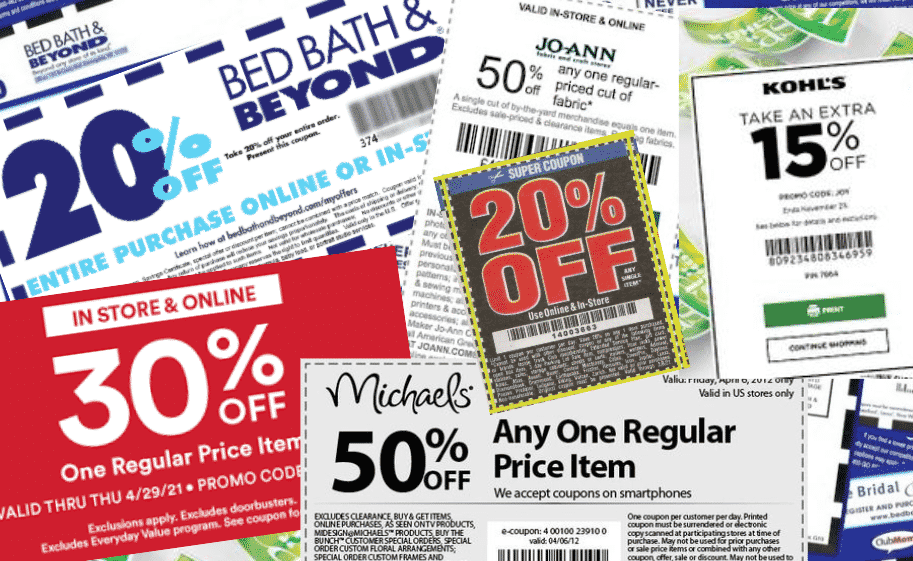
Kohl’s shoppers know to time their purchases for when there’s a good dollars- or percent-off coupon available. Same with JOANN Fabric and Craft Stores. And no Bed Bath & Beyond shopper would even think of making a purchase there without one of the retailer’s famous 20% off coupons.
At the grocery store, however, you’re much less likely to see a total-purchase coupon. So couponing for groceries is generally product-specific – save this amount of money when you buy this particular product.
Which type of coupon do you prefer? Or, more importantly, which helps you save more when you buy more, and which helps a retailer sell more?
Leaving no stone unturned and no topic unstudied, several researchers have put their heads together to determine once and for all which type of coupon is best.
The result of their work, “The effect of permanent product discounts and order coupons on purchase incidence, purchase quantity, and spending,” appears in a recent edition of the Journal of Retailing.
The researchers focused on what they call “permanent discounts,” like those ubiquitous Bed Bath & Beyond 20% off coupons, as opposed to rarer, occasional offers. An occasional offer “evokes a sense of urgency” in getting shoppers to buy right away, but it doesn’t have much of a long-term effect on sales. With coupons that are regularly available, “consumers learn to expect discounts at the next purchase occasion and feel no compulsion” to shop right away – but they might be more inclined to shop at a particular retailer if they know they can always get a discount there.
So the researchers set out to determine which type of “permanent” coupon is most effective for retailers looking to boost business. They studied a full year’s worth of transaction data from an online retailer to see what types of coupons helped generate the most sales. What they found was that “both product-specific price discounts and order coupons offered in a digital environment significantly influence customers’ actual spending and purchase quantity, but in quite different ways.”
Their data showed that product-specific coupons boosted customer spending overall and encouraged shoppers to buy more items per transaction – but only when the coupon offered at least 19% off the product’s regular price. If the coupon discount was worth anything less than that, not enough shoppers were enticed to use it.
In contrast, total-purchase coupons, regardless of their value, had a positive impact on customer spending across the board. “Their values always show positive effects on customer spending and purchase quantity in their baskets,” the study found.
So “retailers should take care to design their discount strategies accordingly,” the researchers advised. “We suggest that retailers should offer order coupons with relatively low value, but product-specific price discounts with high discount depth.” In other words, a product-specific coupon is going to have to offer a savings of at least 19% in order for the coupon to be effective, while a total-purchase coupon is likely to be effective no matter the value, so a retailer might as well try to keep that value as low as possible.
As low as possible, within reason, of course. Bed Bath & Beyond coupons wouldn’t be quite so legendary if they only offered, say, 5% off your purchase. But making the offer too valuable can be risky, too. What if Bed Bath & Beyond coupons always offered 75% off the regular price? It might have you wondering just how “regular” the “regular price” really is. The study cited previous research that found “a drastic price reduction might be perceived as exaggerated or fake… with the result that knowledgeable consumers start to question the retailer’s strategic motivations.”
So prior research cited in the study has identified “a 30% discount as most effective for increasing customer purchases.” Anything less might not be as effective, while anything more might backfire.
And backfiring coupon campaigns can be a real concern, particularly among some grocery retailers who have tried “permanent total-purchase coupons” and regretted it. The onetime California grocery chain Fresh & Easy offered regular dollars-off-your-purchase coupons, then stopped, and faced a customer revolt. So they reluctantly brought the coupons back – and soon went out of business. “The coupons became like crack/cocaine,” one retail analyst observed. “They would boost sales but as soon as Fresh & Easy stopped couponing, it was like withdrawal symptoms — sales would crash.”
The former Florida grocery chain Sweetbay also offered frequent dollars-off-your-total coupons, to the point that many customers wouldn’t shop without them. Adding insult to injury, many would take them to nearby Publix, which happily accepted its competitor’s coupons. Like Fresh & Easy, Sweetbay didn’t last much longer, either.
So there may be good reason that craft, clothing and home-goods stores are known for their “permanent” total-purchase coupons, while grocery stores generally stick to temporary item-specific coupons. This study’s authors would just suggest that all types of retailers heed their advice on the most effective type of whatever coupon they choose to offer. And as far as consumers are concerned, keep the coupons coming, no matter the type – because whether it’s a discount off a specific item or your entire basket, no one wants to be stuck paying full price.














We’ve noticed that Harris Teeter is more often offering $20 off $100 coupons in mailed-to-the-home circulars. While not quite 20% off, it also offers $10 off $75 orders through it’s e-mailed Friday offers.
Both offers have incented me to purchase more than I otherwise would, but I them don’t need to shop as often and wait for the next coupon or offer before shopping again.
I probably spend as much or more than I would, but not on things I would not otherwise purchase. Rather, stocking cleaning products, canned goods, paper goods and pantry staples.
If I am short on a $100 order, I will purchase extra produce or meat items but only to make the $100 or $75 cut off.
Wegman’s offers a weekly $5 off $35 order, and Harris Teeter will generally take these as competitor coupons.
None of the other grocers offer any similar offers but for occasional Friday freebee — that are hardly worth the trouble to get.
I am wondering if the end may be near for HT?
I have been trying to get bed bath and beyond to mail me the coupons to my house. I don’t have a smart phone. They send them to me by email however the don’t printed out coupons.